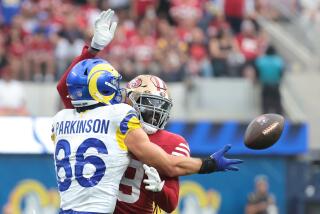No Joe mojo
SANTA CLARA, Calif. -- Before Alex Smith started finding his San Francisco receivers, he first had to find himself.
“I was dropping back like somebody else, trying to play quarterback like somebody else,” recalled Smith, who in part blames his one-touchdown, 11-interception rookie season on his trying (and failing) to emulate Joe Montana. “It was kind of ridiculous.”
Now, after making dramatic improvements in his second season, Smith has the supporting cast to once again aim high.
And this time he and the 49ers might actually be on target.
Bolstered by record-setting running back Frank Gore, freakishly athletic tight end Vernon Davis and recently acquired receivers Darrell Jackson and Ashley Lelie, the 49ers look ready to realize some of the hopes they had when they made Smith the No. 1 pick in the 2005 draft.
Backup quarterback Trent Dilfer, who has a Super Bowl ring and understands the offense as well as anyone on the team, said the improvement of second-year player Davis will make Smith’s job a lot easier.
“Usually you can get real creative in trying to stop the running game and taking away receivers,” Dilfer said. “But it’s very hard to take away a tight end if he’s a weapon, especially if you split him out and move him around. Who do you put on him to stop him? Whatever you do to stop the tight end, you become vulnerable to the run game or to big plays by the receivers.”
That, Dilfer said, will lead to more “vanilla” looks by defenses and one-on-one matchups with receivers.
“I got more straight-up looks in my third year as a quarterback,” he said. “Alex is wiser, better coached and more prepared to make a defense pay for lining up and trying to play straight up with him. He’s much better than I was.”
Yes, there are high hopes for Smith. Should he require a reminder, he need only glance up on his way to work, where he’s featured on a billboard -- one of many around the Bay Area -- touting the 49ers.
“It’s a little trippy seeing that,” he said.
The main reason Smith tried to model himself after Montana was that his offensive coordinator at the time, Mike McCarthy, was Montana’s quarterbacks coach in Kansas City. He provided Smith with hours of footage of the Hall of Fame quarterback directing the West Coast offense, a sort of how-to guide on running the system.
That, coupled with the pressure Smith already felt to succeed, proved daunting.
“I was trying to prove I was the No. 1 pick with every throw,” Smith recalled. “All of a sudden, checking the ball down wasn’t acceptable, taking the incompletion wasn’t acceptable. That ends up hurting you more. You force balls, you make turnovers, you make mistakes.”
Along the way, he fell out of love with the game. It was the kind of sting even his six-year, $49.5-million deal couldn’t salve.
“That rookie year seemed like four years,” he said. “It was very hard mentally. You’re hoping there’s a light at the end of the tunnel and you’re going to come out of it, and that football’s going to get back to what it was -- and it has -- but it’s hard to see that light when you’re in the middle of it. You don’t think it’s ever going to end.”
What’s worse, he was bombarded by advice from coaches, teammates, friends, relatives, even fans who bumped into him away from the facility.
“People I’d just met who had played football for a few years all of a sudden had advice for me,” he said. “Newscasters who were ex-players had advice for me. It was coming from everywhere.”
Just about the only person who didn’t offer him advice was a person very qualified to give him some: Bill Walsh.
The legendary coach, who died July 30, seemed to understand what Smith was going through as a rookie and passed on a chance to pile on some words of wisdom. Instead of instructing Smith, he’d ask him about his family, and how he was adjusting to the Bay Area.
“I appreciated that a lot,” Smith said.
In spite of Smith’s difficulties his rookie year, McCarthy was hired as Green Bay’s head coach. Norv Turner took over as offensive coordinator of the 49ers, and his offense seemed to be a better fit.
Smith wasn’t spectacular last season, but he clearly improved, offsetting 16 interceptions with 16 touchdown passes. His completion rate jumped from 50.9% to 58.1%. He also became the first quarterback in 49ers history to take every snap of the season. And the team finished 7-9, after going 4-12 the previous year.
When Turner left after last season to become coach of the San Diego Chargers, the 49ers replaced him with Jim Hostler, who had been Smith’s quarterback coach his first two seasons. Hostler, in turn, kept the same offense and terminology, thereby easing the transition for his players.
The first glimpse of the retooled 49ers offense was promising. In an exhibition game Monday against Denver, Smith directed scoring drives on both possessions he guided the offense, missed on only one of his five passes and later told reporters, “Everything is really slowing down.”
And when the game seems to slow down for a quarterback, his production usually picks up.
It was just a meaningless exhibition, a mere peek at the way things might look this season. But Smith has learned to appreciate the tiny steps forward, the notion that, day by day, he and his teammates are inching closer to where they want to be.
More to Read
Go beyond the scoreboard
Get the latest on L.A.'s teams in the daily Sports Report newsletter.
You may occasionally receive promotional content from the Los Angeles Times.











